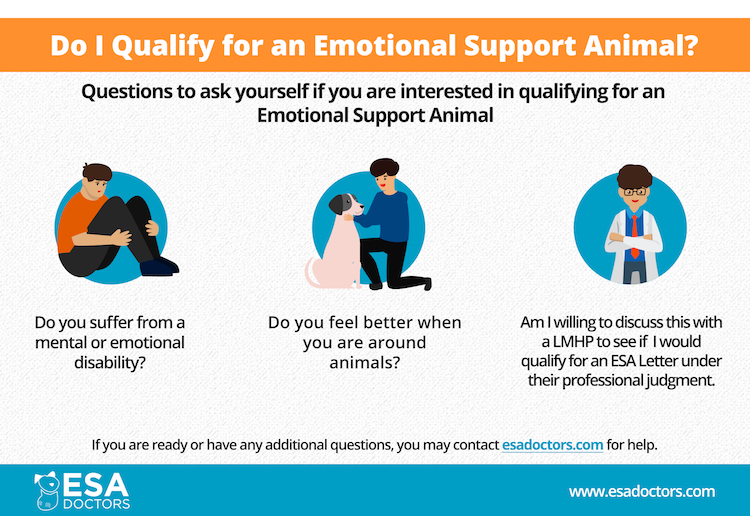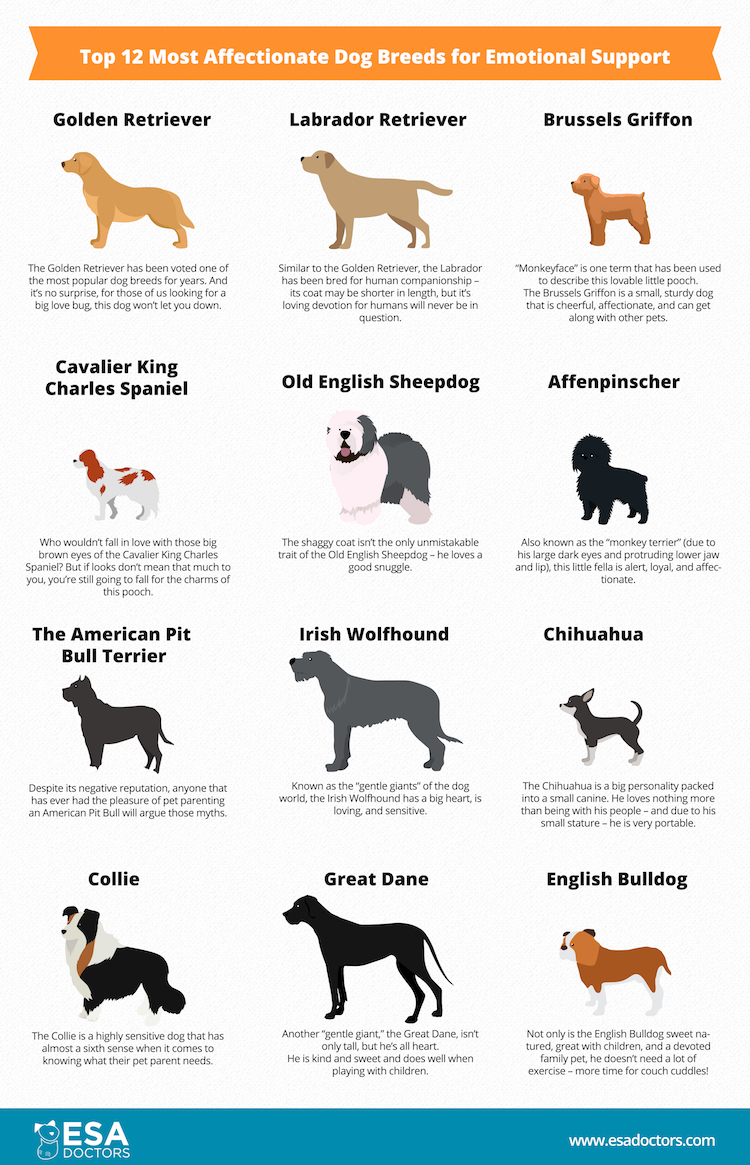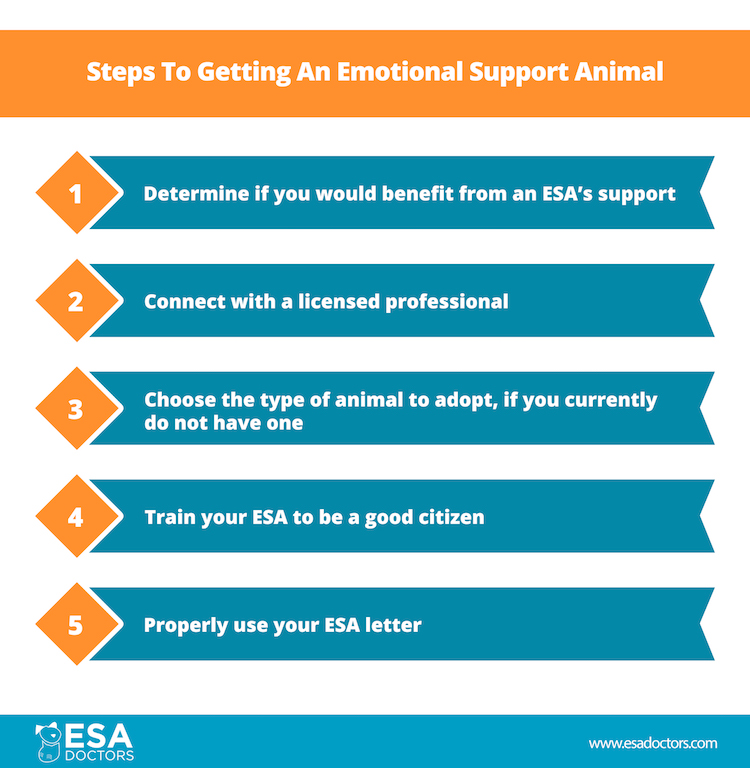Emotional Support Animal, Service Animal, or a Pet?
Is a pet an emotional support animal? Although pets provide humans with companionship and affection, they are not emotional support animals (ESA). An emotional support animal is more than a pet because it serves a very therapeutic purpose, as identified by a healthcare professional, for people who have an emotional or mental disability.
The term emotional support animal is sometimes confused with the term service animal, although they are two similar terms with different qualifications for the animals. An emotional support animal is not formally trained but provides general emotional comfort and company to a person with a disability. A service animal, on the other hand, has had the training to fulfill specified tasks necessary to someone with a disability. Both serve a vital purpose, but a service animal has had training and must assist with one or more specified tasks.
Some animals are known for qualifying for all categories: pet, emotional support animal, and service animal. The Golden Retriever is one of those breeds that perform exceptionally in just about everything they do. As an emotional support animal, however, the Golden Retriever goes above and beyond.

Golden Retriever Traits
The Golden Retriever may be the prom king of dogs. Well-liked, immediately recognizable, wholesome, smart, and athletic, the Golden is just about flawless. Goldens have been bred for millennia to do one thing—keep humans company.
Golden Retrievers have been working hand in paw with humans for hundreds of years, making Goldens eager to assist and be around people. Goldens have all the traits necessary to be ESAs. Gentle, attentive, warm, disciplined, and patient, Golden Retrievers have helped humans with recent tragedies.
Golden Retrievers have been called upon to help people, especially children, recover from trauma after significant tragedies. After Hurricane Katrina and, more recently, school shooting episodes, Golden Retrievers were called in to help provide solace and security. Goldens are often used in the court environment to provide comfort to victims of violence while they are testifying in the presence of their perpetrator. It is this kind of comfort that makes Goldens exceptional emotional support animals.

Golden Retrievers as Emotional Support Animals
Golden Retrievers can function as an emotional support animal for many disabilities. Because they are gentle and attentive, they work well with children. But their size and discipline also make them suitable ESAs for adults.
Golden Retrievers can grow to about 55-95 pounds. Although they are generally peaceful and docile dogs, their size provides people who have Post-Traumatic Stress Disorder (PTSD) with a feeling of security and safety. Having an almost human-sized animal next to them at night can provide PTSD patients with the peace of mind needed for a good night’s sleep.
People with depression can also benefit from a Golden’s sunshiny, goofy, and playful nature. Goldens like to seek attention and will try to gain it by doing silly things. They are natural comedians. Goldens are very attuned to the emotions of the people around them and can provide comfort when it is needed. For people with depression, having an animal like a Golden Retriever can serve as a protective factor, providing them with a reason to perform their activities of daily living.
Children can also benefit from having a Golden Retriever as an ESA. Despite their large size, Goldens are careful and gentle around small children and are very protective. For autistic children and children with a history of trauma, the size and attentiveness of a Golden can help them adjust to the outside world. Non-judgemental and caring, a Golden Retriever can help a disabled child feel less alienated.

How to Get a Golden Retriever
There are several ways to obtain a Golden Retriever as an ESA. If you already have a Golden Retriever as a pet, it is possible to have them designated as an ESA, if you or a dependent are seeing a healthcare professional for an emotional or mental disorder. A healthcare professional can evaluate your situation and, if warranted, write an ESA letter.
It is also possible to obtain an ESA letter and purchase a Golden Retriever through a breeder or pet store. Organizations such as the Golden Retriever Club of America and the American Kennel Club can help direct interested people to legitimate sellers.

A Few Considerations
There are a few things to consider when owning a Golden Retriever as an ESA. Because of their size, Goldens need space to be active. Though landlords must accommodate a Golden Retriever if it is an ESA, the dog needs a reasonable amount of space for its health and wellbeing. Goldens need a living area large enough to allow them to run and play. Traveling with a Golden as an ESA is possible, despite their size. But the airline should be notified to enable accommodations before flying, and an ESA letter is required. As with all ESA dogs, Goldens require appropriate socialization and must be safe around others.
Along with veterinary and grooming fees, Goldens can be costly to upkeep. Golden Retrievers are active large breed dogs and also need a good amount of food and toys. All the costs can add up over time. Are they worth it? Yes! There’s a millennium of proof that Golden Retrievers give more to humans than we could ever return.
See if you qualify for an emotional support Golden Retriever.
Connect with a Licensed Health Care Professional now.

Get the Love and Support you deserve!










My golden retriever is a great emotional support animal! And theyre so easy to train! Really a great dog!
Yes me and my little brothers have a golden and she is the best behaved dog in the world she would be a perfect ESA.
My Golden Retriever keeps me feeling great! She would be a perfect support dog!
Yes , all is true the best part of my day is walking my golden